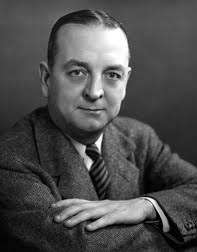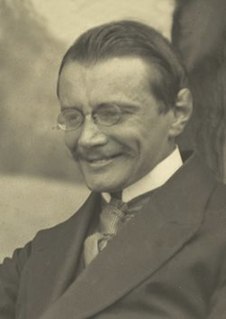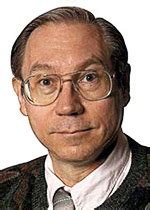A Quote by Sigmund Freud
I have no concern with any economic criticisms of the communist system; I cannot inquire into whether the abolition of private property is expedient or advantageous. But I am able to recognize that the psychological premisses on which the system is based are an untenable illusion. In abolishing private property we deprive the human love of aggression of one of its instruments... but we have in no way altered the differences in power and influence which are misused by aggressiveness.
Related Quotes
One ideological claim is that private property is theft, that the natural product of the existence of property is evil, and that private ownership therefore should not exist... What those who feel this way don't realize is that property is a notion that has to do with control - that property is a system for the disposal of power. The absence of property almost always means the concentration of power in the state.
Private property in the instruments of production is an institutional device both for dispersing power and for securing effective organization of production. The only simple property system is that of a slave society with a single slave owner - which, significantly, is the limiting case of despotism and of monopoly. Departure from such a system is a fair measure of human progress.
We hold that the ownership of private property is the right and privilege of every American citizen and is one of the foundation stones upon which this nation and its free enterprise system has been built and has prospered. We feel that private property rights and human rights are inseparable and indivisible. Only in those nations that guarantee the right of ownership of private property as basic and sacred under their law is there any recognition of human rights.
My concern over private property is that it no longer fosters individuality. The historic destiny of private property is that it has created a highly corporatized economy, and I have to ask myself why. What is it in the market that led 100 capitalists to dissolve into 10 as a result of rivalry and accumulation, 10 into 3, and I think if the system has its way, those 3 into 1?
If history could prove and teach us anything, it would be the private ownership of the means of production as a necessary requisite of civilization and material well-being. All civilizations have up to now been based on private property. Only nations committed to the principle of private property have risen above penury and produced science, art, and literature. There is no experience to show that any other social system could provide mankind with any of the achievements of civilization.
It is also true that the less possible it becomes for a man to acquire a new fortune, the more must the existing fortunes appear as privileges for which there is no justification. Policy is then certain to aim at taking these fortunes out of private hands, either by the slow process of heavy taxation of inheritance or by the quicker one of outright confiscation. A system based on private property and control of the means of production presupposes that such property and control can be acquired by any successful man.
Liberalism makes this mistake in regard to private property and Marxism makes it in regard to socialized property... The Marxist illusion is partly derived from a romantic conception of human nature... It assumes that the socialization of property will eliminate human egotism... The development of a managerial class in Russia, combing economic with political power, is an historic refutation of the Marxist theory.
And the desire to own property, to take for ourselves things which in no way belong to us, does not stop short at the sun. The air is already bought and sold as a commodity, by health resorts. And what of water? Or waterpower? Why should the earth be parceled out into private hands? Is it any different from the sun? No; the earth belongs to the people who live on it. God intended it for them, but it has been taken over by private individuals. Privare means to steal. Thus private property is stolen property - property stolen from God and from humankind!
The quickest and surest way to production, prosperity, and economic growth is through private enterprise. The best way for governments to encourage private enterprise is to establish justice, to enforce contracts, to insure domestic peace and tranquility, to protect private property, and to secure the blessings of liberty including economic liberty - which means to stop putting obstacles in the way of private enterprise.
It has been the fashion to speak of the conflict between human rights and property rights, and from this it has come to be widely believed that the use of private property is tainted with evil and should not be espoused by rational and civilized men... the only dependable foundation of personal liberty is the personal economic security of private property. The Good Society.
What I do know is, in little more than 30 years, we have gone from a nation where the “quiet enjoyment” of one’s private property was a sacred right, to a day when the so-called property “owner” faces a hovering hoard of taxmen and regulators threatening to lien, foreclose, and “go to auction” at the first sign of private defiance of their collective will ... a relationship between government and private property rights which my dictionary defines as “fascism.”
The difference between [socialism and fascism] is superficial and purely formal, but it is significant psychologically: it brings the authoritarian nature of a planned economy crudely into the open. The main characteristic of socialism (and of communism) is public ownership of the means of production, and, therefore, the abolition of private property. The right to property is the right of use and disposal. Under fascism, men retain the semblance or pretense of private property, but the government holds total power over its use and disposal.
If you look at the minutes of the constitutional convention - which we have - Madison who was the main framer, proceeded to develop a system in which - as he put it - power would be in the hands of the wealth of the nation, the more responsible set of men and who recognize the need to protect the rights of property owners. That's why in the constitutional system, the most powerful part of the whole system is the senate.





































